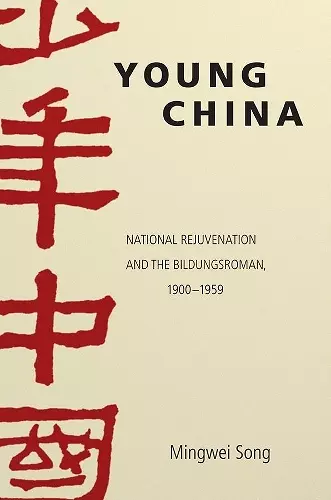Young China
National Rejuvenation and the Bildungsroman, 1900–1959
Format:Hardback
Publisher:Harvard University, Asia Center
Published:7th Dec '15
Currently unavailable, and unfortunately no date known when it will be back

The rise of youth is among the most dramatic stories of modern China. Since the last years of the Qing dynasty, youth has been made a new agent of history in Chinese intellectuals’ visions of national rejuvenation through such tremendously popular notions as “young China” and “new youth.” The characterization of a young protagonist with a developmental story has also shaped the modern Chinese novel. Young China takes youth as a central literary motif that was profoundly related to the ideas of nationhood and modernity in twentieth-century China. A synthesis of narrative theory and cultural history, it combines historical investigations of the origin and development of the modern Chinese youth discourse with close analyses of the novelistic construction of the Chinese Bildungsroman, which depicts the psychological growth of youth with a symbolic allusion to national rejuvenation. Negotiating between self and society, ideal and action, and form and reality, such a narrative manifests as well as complicates the various political and cultural symbolisms invested in youth through different periods of modern Chinese history. In this story of young China, the restless, elusive, and protean image of youth both perpetuates and problematizes the ideals of national rejuvenation.
From foreign students to student activists and from socialist revolutionaries to Red Guards, this book explores the myriad ways in which China’s youth have shaped their nation, and often been transformed, twisted, and sometimes sacrificed in the process. In Young China, Mingwei Song not only tells the story of how Bildungsroman narratives evolved in twentieth-century China, but through this process he also paints a complex portrait of modern China’s own coming-of-age story. This is an essential work from one of the most gifted and insightful readers of modern Chinese literature. -- Michael Berry, Professor of Contemporary Chinese Cultural Studies at the University of California, Santa Barbara, and author of A History of Pain and Speaking in Images
Brisk, refreshing, and brimming with youthfulness, this book paints a self-fashioning journey from old to young China, and articulates sentiments, ideas, hopes, and energy invested in the young and restless. Mingwei Song has broken new ground in literary scholarship by weaving the Bildungsroman into China’s pursuit of nationhood and modernity. -- Ban Wang, William Haas Professor in Chinese Studies at Stanford University and author of The Sublime Figure of History
Young China is a groundbreaking book. Mingwei Song deals with the poetics and politics of ‘youth’ as a dominant trope in the making of Chinese modernity from the late Qing to the founding of the People’s Republic of China. In this book, ‘youth’ is understood as a political agency constructed by Chinese revolutionaries from both the rightist and leftist wings; a pedagogical machine instituted by the May Fourth enlightenment project; and an affective register entertained by Chinese intellectuals. Song contends that the imagination and institutionalization of ‘youth’ evolved to become a powerful discourse in the first half of the modern century, exerting enormous cultural and political impacts on the making of a new, and young, China. -- David Der-Wei Wang, Professor of Chinese Literature at Harvard University and author of Fin-de-Siècle Splendor
A major contribution of this book—in addition to its spectacular interpretations of a wide range of youth discourses and Chinese fictional representations of youth—is its defining characterization of the Chinese Bildungsroman in a broader context of the genre’s central importance to world literature. -- Pu Wang * Modern Chinese Literature and Culture Resource Center *
- Nominated for Joseph Levenson Book Prize 2017
ISBN: 9780674088399
Dimensions: 229mm x 152mm x 31mm
Weight: 671g
396 pages